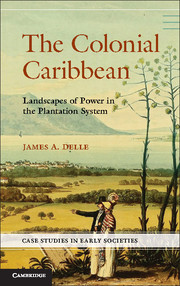Book contents
- Frontmatter
- Contents
- Figures
- Tables
- Preface
- 1 Landscapes of Power in the Colonial Caribbean
- 2 His Majesty’s Island
- 3 The Plantation Mode of Production
- 4 A Class for Itself: Regional Landscapes of the Planter Class
- 5 Contradictions and Dialectics: Village Landscapes of the Enslaved
- 6 Dialectics and Social Change: Plantation Landscapes after Slavery
- 7 Plantation Landscapes in Comparative Perspective
- 8 Conclusion
- References
- Index
7 - Plantation Landscapes in Comparative Perspective
Published online by Cambridge University Press: 05 June 2014
- Frontmatter
- Contents
- Figures
- Tables
- Preface
- 1 Landscapes of Power in the Colonial Caribbean
- 2 His Majesty’s Island
- 3 The Plantation Mode of Production
- 4 A Class for Itself: Regional Landscapes of the Planter Class
- 5 Contradictions and Dialectics: Village Landscapes of the Enslaved
- 6 Dialectics and Social Change: Plantation Landscapes after Slavery
- 7 Plantation Landscapes in Comparative Perspective
- 8 Conclusion
- References
- Index
Summary
The goal of this book has been to evaluate how well a Marxian theoretical framework can be used to interpret the plantation landscapes of colonial Jamaica. In so doing, we have examined a number of material and social realities experienced by those who lived and labored in that colonial context. One danger anyone faces when applying a theoretical framework to a specific case, however, is falling into the trap of tautology. To test the strength of applying Marxist theory to an archaeological study of Jamaica’s plantation landscapes, we must see if the concepts explored in this book can be effectively applied in other plantation contexts. Although many such contexts could be considered, I have chosen here to test the strength of this approach by applying it to what would prove to be England’s most valuable mainland plantation colony, and the locus of much historical archaeology, seventeenth-century Tidewater Virginia.
The Old Dominion: The Colonial World of Plantation Virginia, 1607–1622
Virginia was, of course, England’s first successful colony on mainland North America, and its early history somewhat reflects that of its two most important Caribbean possessions, Barbados and Jamaica. Like Barbados, Virginia was colonized in the opening decades of the seventeenth century with the hope that the poor of the English realms could be transported to a New World to provide a suitable class of servants for those who would make great wealth; like Jamaica by the end of that century, a small oligarchy controlling vast stretches of land held as private property would rule the social world of the colony through the exploitation of enslaved African people. However, the social formations in the Jamaica and Virginia colonies followed different trajectories, both of which can be analyzed through the lens of Marxist landscape archaeology.
- Type
- Chapter
- Information
- The Colonial CaribbeanLandscapes of Power in Jamaica's Plantation System, pp. 198 - 230Publisher: Cambridge University PressPrint publication year: 2014

